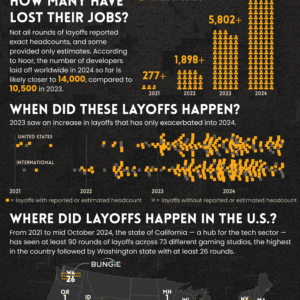Game developers in Maryland and around the globe grapple with widespread layoffs despite the video game industry reporting record revenue. In the aftermath of the COVID-19 pandemic and recent acquisitions and consolidation, tens of thousands of game developers worldwide lost their jobs.
During the pandemic, many took up gaming as a hobby while stuck inside due to pandemic regulations, and high sales continued even after restrictions were lifted.
In 2022, Forbes reported that the video game industry generated more revenue than the film and music industries combined. According to Statista Market Insights, gaming earned just under $250 billion in 2023, and is already reporting $280 billion in 2024 even before the busy holiday season.
The influx of capital brought about several high-profile acquisitions, especially at Microsoft, the owner of Xbox. In 2021, they acquired ZeniMax Media, which is based in Rockville, Maryland and includes Bethesda Game Studios, known for titles such as “Fallout” and “The Elder Scrolls.” Microsoft then purchased the publisher Activision Blizzard for nearly $70 billion in 2023, a deal so large federal regulators both in the U.S. and in the United Kingdom almost killed it.
The industry consolidated around platformers — the few companies like Microsoft and Sony that own the platforms that games are played on — instead of the many publishers that produce games.
“I would argue that because of all this activity, it became one of those fast-growing tech sectors that caught the attention of a lot of new investors that destigmatized largely the gaming category as a mainstream form of entertainment,” said Joost van Dreunen, the CEO of the data intelligence firm ALDORA and an adjunct professor at NYU Stern who teaches about the video game business.
After the pandemic’s boom of expansion in the industry, the market leveled out. Since most video game companies are publicly traded, the shareholders and investors applied pressure to decrease spending.
The result was massive layoffs. In 2023, the year after pandemic regulations in the U.S. had ended, game developer Farhan Noor estimates that over 10,000 developers across the globe lost their jobs. Noor is a technical artist for Riot Games who began taking note of layoffs across game development in 2010 after his first layoff, Noor wrote in a post on the social media site X. He collects data from a wide variety of gaming and business news outlets, studio press releases, personal contacts and social media platforms such as LinkedIn.
Bethesda faced a shocking round of layoffs at the beginning of 2023, said Taylor Welling, a content producer at Bethesda. Microsoft did not release a headcount of those affected.
“That really started shaking people’s sense of stability,” Welling said. “There’s also just the sense of fear that it instills. The industry is laying off people left and right. It seems like on a quarterly basis, there’s another huge round of layoffs that happens, and so you’re always concerned that you’re going to be in the next round — or people that are important to you, that you talk to every day.”
As of November 15, Noor estimates that 14,000 video game developers have been laid off in 2024. At the beginning of the year, Microsoft cut 1,900 staff from its gaming departments. In May, Microsoft shuttered three studios under the Bethesda banner and merged another.
“The layoffs are a result of these high evaluations coming down and companies looking for efficiencies, and they start letting people go to cut costs,” van Dreunen said. “In the games industry, the biggest cost is usually personnel.”

“I expect those companies in a year, year and a half from now, to have to pay a premium to rehire a lot of those people,” van Dreunen said. “But in the meantime, they’re all slimming down and committed to this corporate version of using Ozempic.”
Welling said that in addition to the personal devastation of layoffs, there are also “downstream effects” for the industry.
“People who are trying to get into the industry are now finding it hard to get their foot in the door because they have to compete with people who have a bunch of experience. So that’s difficult for them, but then it’s also difficult for the people who don’t get laid off, because… they’re expecting us to do the same amount of work in the same amount of time with fewer people involved.”
Bethesda then became a leader of another burgeoning trend in the video game industry: unionization.
Unionization efforts at Bethesda began in November 2023 following management’s decision to require three in-person work days, Welling said. By July 2024, Bethesda was recognized as “the first wall-to-wall union at a Microsoft video game studio,” Communications Workers of America (CODE-CWA) announced in a press release.
Bethesda union members organized with help from CODE-CWA and ZeniMax Workers United, a union among quality assurance personnel in Bethesda’s parent company. ZeniMax Workers United went on strike Wednesday due to an ongoing negotiations dispute, IGN reported.
“Unionization has been absent from the games industry for most of its history,” van Dreunen said. “The industry has historically been a bad employer. Things like crunch time are endemic to the games industry, and that’s now starting to change.”
Welling said she hopes unions will become more common, especially with legal efforts like Microsoft’s neutrality agreement that tear down barriers for unionization by mandating that management not interfere with union efforts. While unions can’t outright prevent layoffs, they can offer employees protections and benefits.
“A lot of companies say that working at their company is like a family, and it’s easy to roll your eyes at that, but at Bethesda, it definitely has that foundation to their culture,” Welling said. “So there is a really strong sense of camaraderie and loyalty, not just to the company, but to each other. Despite the difficulties that are facing the industry right now, it’s still a really great place to work.”


You must be logged in to post a comment.